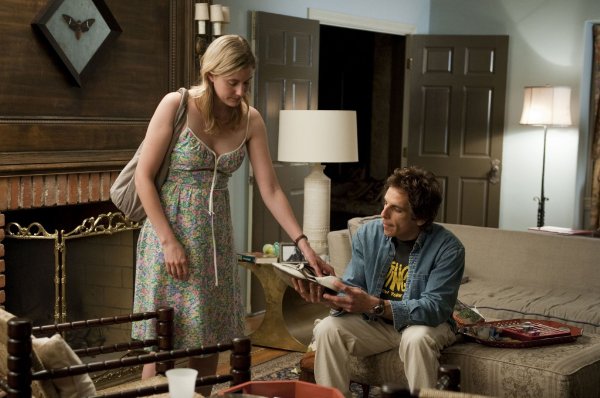Movie review by Greg Carlson
Noah Baumbach continues to develop his best instincts as a storyteller and filmmaker in “Greenberg,” an idiosyncratic Los Angeles-set character study of Ben Stiller’s title layabout, a dysfunctional carpenter in his early 40s. Tenaciously committed to difficult personalities, painfully awkward interactions, and the inability to negotiate much in the way of shared meaning with others, “Greenberg,” like several of Baumbach’s other films, embraces insecurity, failure, and regret the way that so many studio-released romantic comedies utilize madcap coincidence, forced charm, and opposites fighting mutual attraction.
Stiller’s Roger Greenberg returns to LA from New York following a stint in a mental hospital. Holing up in his wealthy brother’s empty Hollywood spread while the family vacations in Vietnam, Greenberg busies himself with a doghouse construction project for his sibling’s ailing German Shepherd. Because he does not drive, Greenberg relies on paid family assistant Florence Marr (Greta Gerwig) to chauffeur him where he needs to go. Inexplicably, the younger woman finds the repellent Greenberg appealing, despite his fussiness, his condescending attitude, and his lack of listening skills. Moments after they meet, Greenberg schools Florence on the nostalgic importance of Albert Hammond’s “It Never Rains in Southern California” and Baumbach makes the scene a miniature masterpiece showcasing Roger’s awfulness.
Gerwig’s background identifies her with the unfortunately named mumblecore genre/category, but unlike her performance as the title character in “Hannah Takes the Stairs,” a movie that Gerwig also co-wrote, Florence actually appears to be deliberately likable and sympathetic. Her mumblecore peers, including Mark Duplass (who also appears in “Greenberg”), often confront audiences with obnoxious, unpleasant, narcissistic creeps, but Baumbach resists the urge to make Greenberg completely despicable, and the casting of Stiller – whose ability to play hurt and humiliation have become a signature aspect of his onscreen persona – cuts the character some slack, deserved or not.
Besides Roger’s resemblance to Saul Bellow’s Moses Herzog (noted by several critics, including J. Hoberman and David Denby), “Greenberg” invites comparison to “Annie Hall,” and the movie quotes several moments and gags from Woody Allen’s classic, even though Baumbach’s creations inhabit a milieu decidedly less magical and romanticized. In addition to first-rate technical credits, including photography by the terrific Harris Savides, “Greenberg” bests many of its mumblecore relatives by way of Baumbach’s ability to present unlikable characters without succumbing to belligerence toward or contempt for the viewers willing to go along with the atypical choice.
Baumbach, who wrote the screenplay after developing the story with partner Jennifer Jason Leigh (who also appears in the movie as Greenberg’s ex-girlfriend), illustrates his lead character with greater confidence than he musters for Gerwig’s Florence. Florence’s passivity, uncertainty and self-reproach create a big hole that Greenberg fills with cruelty, and the resulting imbalance constitutes the film’s most uncomfortable strain. Baumbach literalizes Florence’s marginalized status as a servant to the wealthy extended Greenberg family in the first of several calamitous sexual encounters between Roger and Florence, when a lacerating parody of a horrible “first date,” or more accurately, “first encounter,” amplifies the gulf of privilege between them. Jessica Grose, in a “Slate” essay, calls the scene “brutish and contrived,” and whether one agrees with that assessment or not, “Greenberg” is a movie that stirs up complex emotions.
